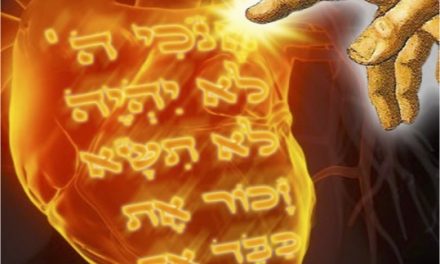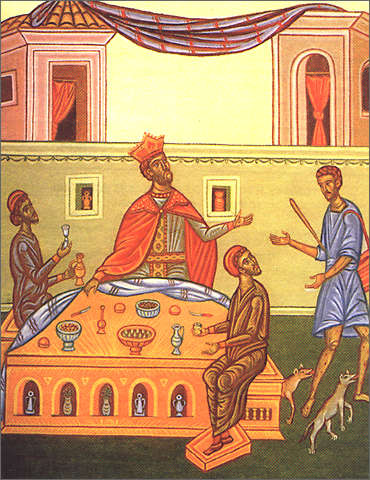Deuteronomy 26:4-10
Psalm 91
Romans 10:8-13
Luke 4:1-13
“Become who you are!” This most memorable saying of Bl. Pope John Paul II was also one of his most enigmatic. Many have been deeply moved by it, but many have also been deeply puzzled by it. What could it possibly mean? How can you become what you already are? Surely it must be more than just a dramatic rephrasing of “realize your potential” or “be all you can be,” right? I started to get a glimpse of that “more” when I heard a friend recall to me how his mother would send him out the door to the school bus each morning: she would kiss him and say “remember who you are.”
Remember who you are. What a valuable thing to be told on a daily basis! If psychoanalytical theory has done any good for the world, it has been its unflinching insistence that we are very often—perhaps even most of the time—not the people we think we are. We naturally assume that our own subjectivity automatically gives us a privileged standpoint from which to regard our true selves, but of course such an alignment is highly contingent, and indeed very fragile. The observation that humans are creatures who are prone to profound self-deception is at least as old as Genesis. In light, then, of the prospect that I may have very little idea who I actually am at any given moment, the phrase “become who you are” takes on real significance. It carries the implication that one must first discover who one is and then strive to accept and live out that truth.
The fact is, we often forget who we are (if we ever really knew in the first place). That is why I find the first reading for this Sunday so incredibly important to the Christian moral life. It gives the people of Israel a directive to gather together as a community and declare to one another—and to oneself—the story of who they are. “My father was a wandering Aramean.” It is in this brief reprise of the formation of God’s people that one is given the opportunity to recall who they are.
Something similar happens each Ash Wednesday, when Catholics receive the ashes of the previous year’s palm branches on their foreheads and are told “remember that you are dust and to dust you shall return.” The variant “repent and believe in the Gospel” is equally anamnetic: “you are someone who needs repentance, who needs faith and who needs the good news of Jesus Christ.” We are reminded not only that we are mortal, but that we stand in need of grace.
As it was for Israel, this exercise of remembrance helps to snap us out of our self-deceptions, an experience that elicits both confidence and gratitude, in light of the fact that “we cried to the LORD, the God of our fathers, and he heard our cry and saw our affliction.” The point is that in returning to God, we return to our who we really are at the deepest level of our being.
Remembering who we are is ultimately a matter of attention. Simone Weil is famous for saying that “attention is the substance of prayer,” and hence the substance of our love of God and neighbor. In light of this week’s gospel readings, I would also add that attention is also the epicenter of the human struggle with temptation. In the desert, the devil does not merely aim to trick Jesus into breaking a rule or committing some act of external impurity. The tempter’s goal is to divert Jesus’ attention from the Father. As the last temptation aptly demonstrates—the one where the devil tells Jesus to jump off the top of the Temple—the struggle is ultimately not about whether or not Jesus can maintain his will-power (though some perhaps do struggle with the uncontrollable desire to jump off buildings) but whether or not Jesus will continue to view himself as part of a drama in which he is not the central character. For you see, to force the Father’s hand to save him in mid-air would be to cease a life of total response and obedience, and effectively to relegate the Father to a supporting role in a drama in which Jesus is now the main actor. It would be, in a word, to forget himself—to cease “becoming what he is.”
The temptation in the desert is in this way strikingly similar to the temptation in Eden. First the serpent tries to get Eve to forget God’s directives by asking whether God forbade eating from any tree in the garden. Though Eve corrects him by saying it was only this tree, she nevertheless adds a slight exaggeration by saying that merely to touch it would bring death. But of course, God did not say that; and so we see that the serpent succeeds in getting Eve to view the command as more onerous than it was. Eve is beginning to forget herself.
The serpent then goes for the kill by suggesting a fundamental rupture between who God meant her to become and who she really could become, if she only takes it upon herself to break the shackles God has placed on her identity. Having welcomed the possibility of this split into her heart, it quickly dissolves the memory of who she was before. Thus the tempter’s mission is accomplished not at the moment when her lips pierce the skin of the fruit, but at the moment she withdraws her attention from God and directs it toward a future self which she now believes is her real self. As Dominique Barthelemy puts it in his wonderful book God and His Image:
It was not the fact of having heard or of having acted; it was the fact of having lent her ear willingly, of having reflected and dwelt on the possibility, of having as it were forgotten in that moment all her daily experience of God’s dealing with their lives, of God’s dealing with creation, and of having preferred instead the most unlikely eventuality, which was at the same time the most terrifying: that she might be the sport of God….
Or, as Fr. Michael Himes nicely puts it in The Mystery of Faith, the serpent was attempting to get Eve to forget that she was already “made in the image of God.” He was in a sense inviting her to “become what she was,” but only after first getting her to forget that she was already in fact “like god”: that she had already received this potential divine similitude as a gift. He convinced her to try to become what she was, but only after erasing the memory of her true self so that she might seek this goal on her own terms and by her own power. The decisive factor, then, that determines the respective trajectories of these two paths is nothing other than the direction of one’s gaze.
In the desert, Jesus’ gaze upon the Father does not falter. Jesus remembers who he is. “This is my beloved Son, with whom I am well pleased” (Matthew 3:17). During this Lenten season—this period in the desert—let us strive to remember who we are, and to become who we are: sons and daughters of Abraham (that wandering Aramean) and sons and daughters of God Most High.
“See what love the Father has bestowed on us that we may be called the children of God. Yet so we are. The reason the world does not know us is that it did not know him. Beloved, we are God’s children now; what we shall be has not yet been revealed. We do know that when it is revealedwe shall be like him, for we shall see him as he is.Everyone who has this hope based on him makes himself pure, as he is pure.” I John 3:1—3





Trackbacks/Pingbacks